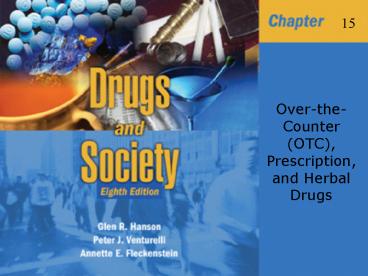Over-the-Counter (OTC), Prescription, and Herbal Drugs - PowerPoint PPT Presentation
1 / 21
Title:
Over-the-Counter (OTC), Prescription, and Herbal Drugs
Description:
Types of OTC Drugs Internal analgesics Salicylates Ibuprofen-like Acetaminophen Therapeutic considerations Analgesic actions Anti-inflammatory effects Antipyretic ... – PowerPoint PPT presentation
Number of Views:241
Avg rating:3.0/5.0
Title: Over-the-Counter (OTC), Prescription, and Herbal Drugs
1
Over-the-Counter (OTC), Prescription, and Herbal
Drugs
2
Prescription OTC Drugs
- Prescription drugs are available only by
recommendation of an authorized health
professional, such as a physician. - Nonprescription (over-the-counter, or OTC) drugs
are available on request and do not require
approval by a health professional.
3
Prescription OTC Drugs
- Prescription and OTC drugs have been viewed
differently by the public since the
classifications were established by the
Durham-Humphrey Amendment of 1951. - In general, the public views OTC drugs as
minimally effective and safe and prescription
drugs as more potent and frequently dangerous - However, these distinctions are not always
accurate
4
OTC Drugs Interesting Facts
- Each year the U.S. spends over 14 billion on
OTC drugs - More than 300,000 different OTC products are
available on the market - OTC expenditures comprise 60 of the annual drug
purchase in the U.S. - An estimated 3 out of 4 people routinely
self-medicate with these drug products
5
Abuse of OTC Products
- OTC products generally have a greater margin of
safety than their prescription counterparts, but
issues of abuse need to be considered. - Physical dependence
- Psychological dependence
6
Abuse of OTC Products
- Nonprescription products that can be severely
habit-forming decongestants, laxatives,
antihistamines, sleep aids, and antacids. - The active ingredients in OTC drugs have been
classified and placed in category I (considered
safe and effective)
7
Switching Policy of the FDA
- The FDA is attempting to make more drugs
available to the general public by switching some
frequently used and safe prescription medications
to OTC status. - This policy is in response to public demand to
have access to effective drugs for
self-medication and has resulted in approximately
700 drug products switching from prescription to
OTC status
8
OTC Drugs and Self-care
- The majority of health problems treated in the
United States can be treated with OTC
medications. - If done correctly, self-care with OTC medications
can provide significant relief from minor,
self-limiting health problems at minimal cost.
9
OTC Labels
- Required label information includes
- Approved uses of the product
- Detailed instructions on safe and effective use
- Cautions or warnings to those at greatest risk
when taking the medication
10
Label Information Controlled by the FDA
When to use How to use What to watch
for Possible drug interactions When drug should
no longer be used
Product name Identity Active ingredients Quanti
ty Manufacturer
11
Rules for Proper OTC Drug Use
- Always know what you are taking.
- Know the effects.
- Read and heed the warnings and cautions.
- Dont use anything for more than 1 to 2 wks.
- Be particularly cautious if also taking
prescription drugs or herbal products. - If you have questions, ask a pharmacist.
- If you dont need it, dont use it!
12
Types of OTC Drugs
- Internal analgesics
- Salicylates
- Ibuprofen-like
- Acetaminophen
- Therapeutic considerations
- Analgesic actions
- Anti-inflammatory effects
- Antipyretic effects
- Side effects
13
Types of OTC Drugs
- Cold, allergy and cough remedies
- Decongestants
- Antitussives
- Expectorants
- Vitamin C
- Sleep aids
- Antihistamines
- Melatonin
- Stimulants
- Stay-awake or energy-promoting
14
Types of OTC Drugs
- Gastrointestinal medication
- Antacids and anti-heartburn medication
- Diet aids
- Skin products
- Acne medications
- Sun products
- Skin first-aid products
- OTC herbal products
15
Prescription Drugs
- There are currently more than 10,000 prescription
products sold in the United States, representing - Approximately 1500 different drugs
- With 20 to 50 new medications approved each year
by the FDA
16
Prescription Drugs
- According to the Durham-Humphrey Amendment of
1951, drugs are controlled with prescription if
they are - Habit-forming
- Not safe for self-medication
- Intended to treat ailments that require the
supervisions of a health professional - New and without an established safe track record
17
Doctor-patient Communication
- When a physician prescribes a drug, a patient
should insist on answers to the following
questions
-What is the desired outcome?
-What are the possible side effects of the
drug?
-How should the drug be taken to
minimize problems and maximize benefits?
18
Generic and Proprietary Drugs
- Generic is the official, nonpatented,
nonproprietary name of a drug. The term generic
is used by the public to refer to the common name
of a drug that is not subject to trademark
rights. - Proprietary, a brand or trademark name that is
registered with the U.S. Patent Office.
Proprietary denoted medications are marketed
under specific brand names, i.e., Valium.
19
Common Categories of Prescription Drugs
- Analgesics
- Nonsteroidal antiinflammatory (NSAIDS)
- Narcotic analgesics causing abuse problems such
as with OxyContin - Antibiotics
- Antibacterials
- Antidepressants
20
Common Categories of Prescription Drugs
- Antidiabetic drugs
- Antiepileptic drugs
- Antiulcer drugs
- Bronchodilators
21
Common Categories of Prescription Drugs
- Cardiovascular drugs
- Antihypertensive agents
- Antianginal agents
- Drugs to treat congestive heart failure
- Cholesterol and lipid-lowering drugs
- Hormone-related drugs
- Sedative-hypnotic agents
- Drugs to treat HIV































